Adding the printf("Hi!\n") statements allows the code to work. It also works if the bound initial bound is improper and the user enters a new one. When I ran some tests calculate divers sometimes returned a character instead of an integer. I'm thinking it has something to do with my memory allocation. I also noticed that ./a.out 6 10 "|" would work but ./a.out 6 25 "|" would not causing an infinite loop when printing the lines of "|".
#include <stdio.h>
#include <string.h>
#include <stdlib.h>
// Structs
typedef struct data_struct {
int lineNumber;
int divisorSum;
char type[10];
}data;
// Prototypes
int calculateDivsors(int integer);
// Functions
int main (int argc, char *argv[]) {
int lowerBound;
int upperBound;
char character;
// Gets the values from command-line
sscanf(argv[1], "%d", &lowerBound);
sscanf(argv[2], "%d", &upperBound);
sscanf(argv[3], "%c", &character);
// Check to see if bound is proper
while (upperBound <= lowerBound || lowerBound < 2) {
printf("Error, please enter a new range (positive increasing).\n");
scanf("%d %d", &lowerBound, &upperBound);
}
// Structure calls
data* info = NULL;
int totalData = upperBound - lowerBound;
// Allocate the memory
info = (data*)malloc(totalData * sizeof(data));
printf("Hi!\n");
if (info != NULL) {
// Iterate through all the digits between the two bounds
for (int i = lowerBound; i <= upperBound; i++) {
int sum = calculateDivsors(i);
// Write data to indiviual structures
info[i].lineNumber = i;
info[i].divisorSum = sum;
// Check to see if the sum is greater than, less than, or equal to the original
if (sum == i) {
strcpy(info[i].type, "Perfect");
}
else if (sum > i) {
strcpy(info[i].type, "Abundant");
}
else if (sum < i) {
strcpy(info[i].type, "Deficient");
}
// Line n# has a column width of 4, string of 10
printf("%4d is %-10s\t", info[i].lineNumber, info[i].type);
// Generate Pictogram
for (int j = 0; j < info[i].divisorSum; j++) {
printf("%c", character);
}
printf("\n");
}
}
}
// Adds up the sum of diviors
int calculateDivsors(int integer) {
int sum = 0;
for (int i = 1; i < integer; i++) {
// Add to sum if perfectly i is a sum of integer
if (integer % i == 0) {
sum += i;
}
}
return sum; // Returns the sum of diviors
}
